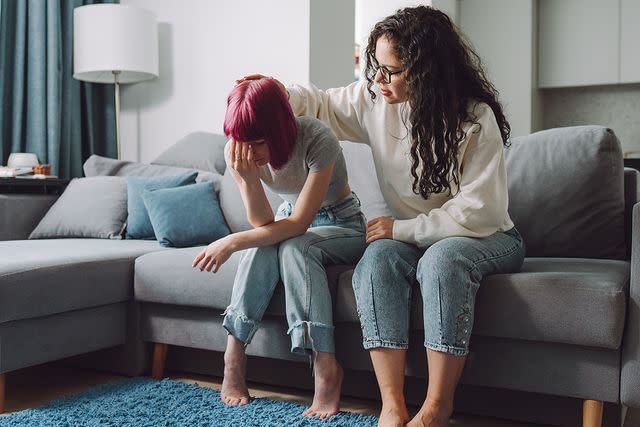What to Do if You Suspect Your Child Has Depression or Anxiety
“It’s hard to be a kid these days,” says child and adolescent psychologist Becky Lois. Here's how to support a kid in need

Getty
Anxiety is on the rise for kids across the country, the American Psychological Association reports.
“We are seeing an increase in anxiety across kids,” says child and adolescent psychologist Becky Lois, the co-director of the KiDS of NYU Foundation Integrated Behavioral Health Program at Hassenfeld Children’s Hospital at NYU Langone. “It’s hard to be a kid these days.”
Younger kids may not have the words for what they’re feeling; they may have headaches, tummy aches, or throw tantrums. Older kids might seem angry or moody, but they could actually just be really sad.
If you suspect your child may be suffering from depression or anxiety, the first thing to do is talk to them to find out what’s going on, says child and adolescent psychologist, Karin Price.
“I tell parents that it's okay to start a conversation and listen for a while. You don't have to jump to, ‘My kid needs a therapist' right away,” says Dr. Price, who is the Chief of Psychology at Texas Children’s Hospital. “Growing up is stressful.”
Feelings of sadness, irritability and loneliness are all normal. When those feelings overtake your child’s life and stop them from doing things they love, though, it's time for a closer look. Are they not going to school? Are they not eating? Are they not sleeping anymore? Do they feel sad, guilty, and worthless all the time? Then those kids need “significant support,” Dr. Price says.
“We really want to make sure that those young people get into treatment pretty quickly. And for more significant depression, we want to start with therapy for sure,” Dr. Price says.
Parents often call psychiatrist Moira Rynn, and say they aren’t sure if what their kid is experiencing is a problem, or if they are over-reacting.
“Anxiety is a normal experience,” says Dr. Rynn, professor and chair of the Department of Psychiatry and Behavioral Sciences at Duke University School of Medicine. “It is an adaptive emotion.”
Dr. Rynn tells parents that if they think something is wrong, they’re probably right. But, there is help.
“The wonderful news is that kids are resilient, and they are constantly growing and changing and they respond great to treatment,” says Dr. Rynn. “There's help. Treatments work, interventions work.”
Seeing some signs of anxiety or depression in your child, but you're not sure where to start? We got expert advice on tips for how to handle the issue at home.

Getty
1. Listen – and resist the urge to tell them everything is okay.
The best thing parents can do is listen, says Dr. Price.
“Start the conversation with, ‘Hey, I've noticed some differences in how things have been going for you lately, I'm wondering how you're doing,’” she says.
She urges parents to refrain from saying platitudes like “Oh, it’s not that bad,” or “Don’t worry about it,” or “It’ll get better.”
“For parents, it's our natural tendency to want to make our kids feel like everything is going to be okay. But we can fight back against that instinct and listen, and, even when we want to say, ‘That doesn't sound that bad,’ say, ‘It sounds like that's really bothering you a lot' [instead]," she suggests.
If you dismiss the child’s fears, then they will stop talking, and the goal is to “keep the conversation going,” Dr. Price says. “That's how we are going to learn what's going on."

Texas Children's Hospital
Dr. Karin Price, Chief of Psychology at Texas Children's Hospital2. Ask Questions.
If your kid won’t talk to you? Talk to them.
“Sometimes kids are not going to say much, but it doesn't mean that we can't ask some questions,” Dr. Lois says. “Pop into their room and sit down on their bed and say, "I just want you to know that I'm thinking of you and I'm here if you need anything."
Dr. Lois recommends a technique she calls a “mind read.”
“Say things out loud like, “Maybe you're having a hard time in school right now, this time of year can be really difficult,” she says. “Even if your child isn't giving you any information, state a few hypotheses. Like ‘I wonder how things are going with you with your friends. You haven't brought so-and-so around lately', or 'I haven't heard you talking about Joe'.”
Sometimes playing “multiple choice” helps a child. “Giving a few options can sometimes be a helpful way for a conversation to be started,” she says.

Getty
A teen with anxiety3. Don’t tell them not to worry.
There are a lot of things in the world today for kids to feel stressed about, and many of those worries are logical and rational.
“There are so many reasons for kids to be anxious these days. So many things for them to worry about. The world is a very scary place,” Dr. Lois says. “As a parent, when somebody is anxious, sometimes reassurance is really unhelpful. Because when we say, 'Don't worry, everything will be okay,' we don't know that. We don't know that everything will be okay.”
She continues: “We can't answer all of their questions. We can't reassure all of their fears away, so we have to just acknowledge that the fears make sense and also that we're here to support them and answer any questions that we can, and that they are strong and capable people,” she says. “The worst thing we can do is say, 'Don't worry, you'll be fine'.”

Juliana Thomas/ Hassenfeld Children's Hospital at NYU Langone
Becky Lois, PhD, child and adolescent psychologist at Hassenfeld Children's Hospital at NYU Langone4. Work through the worries with them.
Rather than dismiss the child's worries — even the ones that seem the most far-fetched — Dr.Lois encourages parents to do “detective work,” and talk through a child’s worries worst-case scenarios.
“Say, "Tell me more. Tell me what you're worried about. What's the worst thing that you think could happen? Do we have any evidence to suggest that that's going to happen?" she says. “We talk sometimes like putting that worry thought on the stand as if you were a lawyer on trial and you'd say, ‘What evidence do you have that that worry is real or that's going to happen?' "
“You're helping the child to really critically examine the worries and understand if they have any reality and if they're helpful to continue to sit with, versus let go,” she explains.
5. Make a coping plan together.
Engage your child in making a plan of action. Ask: “What are some things you think we could do to make that better or to help you feel less worried?” Dr. Lois suggests. That helps the child build their coping skills, so they can become more resilient and self-reliant — after all, "sometimes you won’t be there,” she says.

Getty
A parent and teen working through anxiety together6. Help them put down the devices, get outside and move.
Do yoga, talk a short family walk, have a kitchen dance party, or offer to take them and a friend to a fun activity. Try to get them to take a break from social media and hang out with people in real life.
“A lot of times kids fall into the trap of everybody else's life looks amazing. It does look amazing on social media. They're right,” Dr. Price says. “[On social media], everybody else is happy. Everybody else has a ton of friends. Nobody else has parents that are so rude or strict or mean.”
If you see troubling signs that your child's normal anxiety could be turning into something more, work with them to schedule regular activities and get into a routine. “Depression has an opportunity to really grow and take up a lot of space if we let it,” Dr. Lois says.
7 . Connect with other parents.
“Our world feels a little hard right now when we think about what we see and hear on the news. And as parents, we think about all of the awful things that can happen to our children when they're out of our sight,” Dr. Price says.
Connecting with other parents who are having similar experiences will make you feel less alone, and they might have some helpful tips. “They might say, ‘Yeah, my kid was really struggling last semester. And what helped was (fill in the blank),” Dr. Price says.
8. Consider seeing a therapist yourself.
For many children, a parent going to therapy can be just as effective as the child seeing a therapist. For one, it can help normalize the process for a hesitant kid, and for another, it can provide parents with helpful tools to model good behavior and support their kid when needed.
“I'm great at my job, but I don't expect a kid to get better just spending 45 minutes a week with me! No therapist is magic,” Dr. Price says. “We're teaching kids skills, we are teaching them ways to cope and adapt. And then we want to make sure that we're giving the parents the tools and skills that they need to support their children in doing those things when they are out in the real world, not just when they are sitting with me in my office.”
9. There’s an app for that!
One good way to use technology for an anxious or depressed kid, Dr. Rynn suggests? Download apps such as Calm, Worry Time, Breathe or Triangle of Life (ABCT's app guide has many recommendations) or try a podcast. Dr. Rynn likes "The Guide to the World of Anxiety" with Esheeta Devang.
You can also refer to relevant websites to give you more information and tools to help your child.

Duke Health
Dr. Moira Rynn, professor and chair of the Department of Psychiatry and Behavioral Sciences at Duke University School of Medicine10. Talk to your pediatrician.
If you’re worried, reach out to the your pediatrician, Dr. Rynn advises. Many doctors have mental health screening tools and some offices are now incorporating mental health practitioners in their practice.

Getty
A family seeing a doctor11. Talk to your school.
Many schools have a social worker, a psychologist, social worker or a counselor who can work with your child at school. They can be an added support for your child throughout the day. Talk to their teacher to share what you're seeing at home, and find out if it is spilling over into the child’s school day.
Dr. Rynn had one patient who was simply not a good fit with their teacher; just changing classrooms resolved all the child’s stress and anxiety.
Additionally some school districts, such as Northern Virginia’s Fairfax County Public Schools, are now offering free, virtual mental health resources for all high school students.
For more People news, make sure to sign up for our newsletter!
Read the original article on People.


